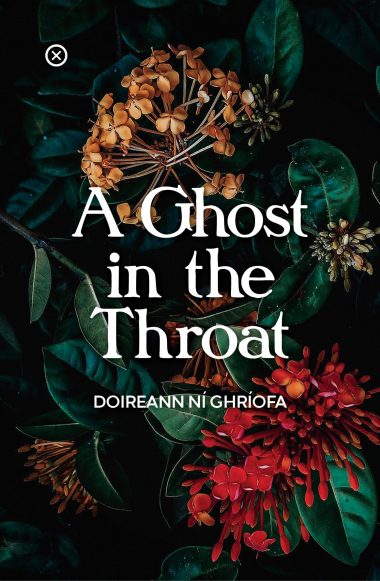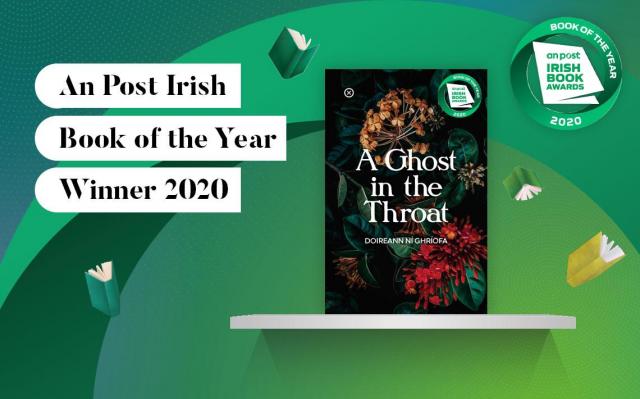(AnPost)
‘This is a female text’
As Anne Enright herself has tried and failed to define this book’s genre, I don’t feel too bad about not being quite able to sum it up myself. Here, however, is my attempt;
It reads like a history or a memoir, sounds like a poem and a personal essay in its lyricism, fascinates like a historical fiction, and obsesses and nitpicks like a research paper. It croons like poetic analysis and haunts like a tale of obsession and possesses you like a summoning, a seance.
It is all of these things. And none of them, all at once.
It is also a female text.
Confused yet?

This book, published by the inimitable Tramp Press, follows Doireann Ní Ghríofa’s journey to uncover the life of Eibhlín Dubh, the composer of an extraordinary poem keening her husband’s untimely death. But it is more than that. Ní Ghríofa’s text is haunted by the presence of the widow poet, following Ní Ghríofa through her journey of motherhood. And while at first glance, this may come across as a high-brow literary endeavour, what struck me most was its accessibility.
Every word she pens is loaded and immersive and almost scholarly in its poetic depth. But it is executed in such a deeply personal way that the book quickly becomes hard, fast and addictive. This is a book for the woman who was the girl who was ‘terrible at sums and at sports, a girl given to staring out windows, a girl whose only real gift lies in daydreaming’. This is a book for the Irish and poetry lovers, the social historians, the widows, the neighbour who lives alone, the new mother, the new mother’s mother, the person who feels like the present holds none of the passion of the past.
But what does a female text mean?

In one way, it means that the female body is held up to the light. There is no fading out from painful hospital scenes, to convey the birth is occurring and suddenly a perfect baby is swaddled in the arms of a perfectly made-up mother. This text shows the breathless, heart in your mouth, dread in your belly live action birth. It is insistently female, inherently, bodily, filthily female. Female in its throat swollen with tears, female in the strange animalistic tendencies that dog the body after birth, female in the deletion of our own presence as mothers.
The clothes put away, the table wiped down, the clearing of space – motherhood, as Ní Ghríofa sees it is the obliteration of presence, of becoming the quiet answer to someone’s need;
‘I am one of The Many whose working day does not have a clocking-out time. Anyone whose days revolve around domestic work knows the satisfaction that can be found in such labour, … There is a peculiar contentment to be found in absenting oneself like this, subsumed in the needs of others; in such erasure for me lies joy…in this my work is a deletion of presence.’
The female body is a gift overflowing, depleted to be filled again, with milk, with children, with service, domestic and otherwise. It desires, it breaks, it creates and rewrites the history of a landscape. The ripples and reverberations it can create across time and history are written in the lines and curves, scars and breakages, the charged and mystical power of Ní Ghríofa’s body by the text’s end, in a triumphant joy – she is creation.
This is a female text.

But the curious second part of being a female text is at odds with the quiet joy she finds in this self-erasure; the uncovering of a female presence. In these busy domestic hours she spends in deleting herself, her mind wanders to Eibhlín Dubh, a woman mostly lost in history.
Wandering thoughts quickly turn to obsession, as an act of translation becomes an act of recovery as if she wants to crawl inside Eibhlín’s skin and live there. Ní Ghríofa hoards her knowledge of Eibhlín like a dragon hoarding hoarding treasure. Nuggets of new information comes to light as she pores over male texts to uncover the female absences within, hoping they may lead to a deep, undiscovered domestic history. A history lovingly constructed, this is not a life found in political or historical textbooks, but an interior female life found in the gaps of information, from reading between the lines.
Ghostly and electric, Eibhlin hums by her side, the ghost growing more corporeal throughout the book until she mourns and laughs at her side. In constructing a female history, one is not concerned with knowing people through their relation to war or politics, but through their family and beliefs and household running. In the atmosphere of a home, of daily life and relationships and the small vitally important social and domestic pieces of life that made up people’s day to day; that is where Ní Ghríofa finds Eibhlín, and the women in the lives of these documented men.
Ní Ghríofa’s research is fascinating and weaves a dark and holy sense of lives disturbed by this probing two centuries later. A necromancer, she summons the dead, and in their voices echo the memories that were once held in long abandoned places, the domestically charged spaces of women written out of history. Ni Ghríofa raises them all and conducts her dance of the dead as if she wishes to be with them or they with her.

She mourns the silences that punctuate these women’s lives, the gaps in the text unfilled, like Sappho’s fragmented poems, like missing jigsaw pieces, locks without keys. We will never know what Eibhlín Dubh felt or thought upon returning to her family home, a widow at fifteen and again in her twenties. A woman’s history is one of absence. But Ní Ghríofa, with a tenderness that is heart wrenching, resurrects every passing female figure, the lady gardener, the wives of Eibhlín's sons, the servant girls terrified by the mad men, the mare, no one is a passive character to her. Under her care they all become main characters, with their own stories and voices.
This is a female text.
‘How I wish that someone had thought more women’s words worthy of a place in that in that old secretaire. All the diaries and letters and ledgers I imagine in female handwriting, they must have existed once, until someone tidied them into a waste bin, tipping them neatly into oblivion.’
My notes for this review were a mess. My awe at this text was so wordless at times, all I could manage was a ‘page 91 so damn compelling’ or ’74-75 just…ugh’. Sometimes the prose literally just split my face in a grin, and I sat there smiling like a fool. That is the effect of this text. I was rendered momentarily illiterate, momentarily silent. Those who know Ní Ghríofa’s poetry will spot scenes that inspired some of her poetic work and will perhaps recoil a little at the goriness of the prose in these parts in comparison with the lyrical wandering of her poetry – I’m thinking specifically of ‘A Jaw Ajar’, one of my favourites. But nonetheless, fans will recognise the same brutal, interconnected, domesticity that hallmarks her poetry, the strange, feminine slant on seemingly everyday situations. Every word is laden with meaning, each sentence a thread pulled in a rich and unravelling tapestry.
The passion of Eibhlín lives within her, a safe vessel through which express her own constant longing and desire, insatiable, insurmountable, too old fashioned, too dramatic, too intense for this modern world. She gives us the shards of her soul, her story, herself and asks us not to fix it. To look at it in its parts, to construct our own whole, of how she had once been, of what she is now. It is through Eibhlín that we come to know Ní Ghríofa.







